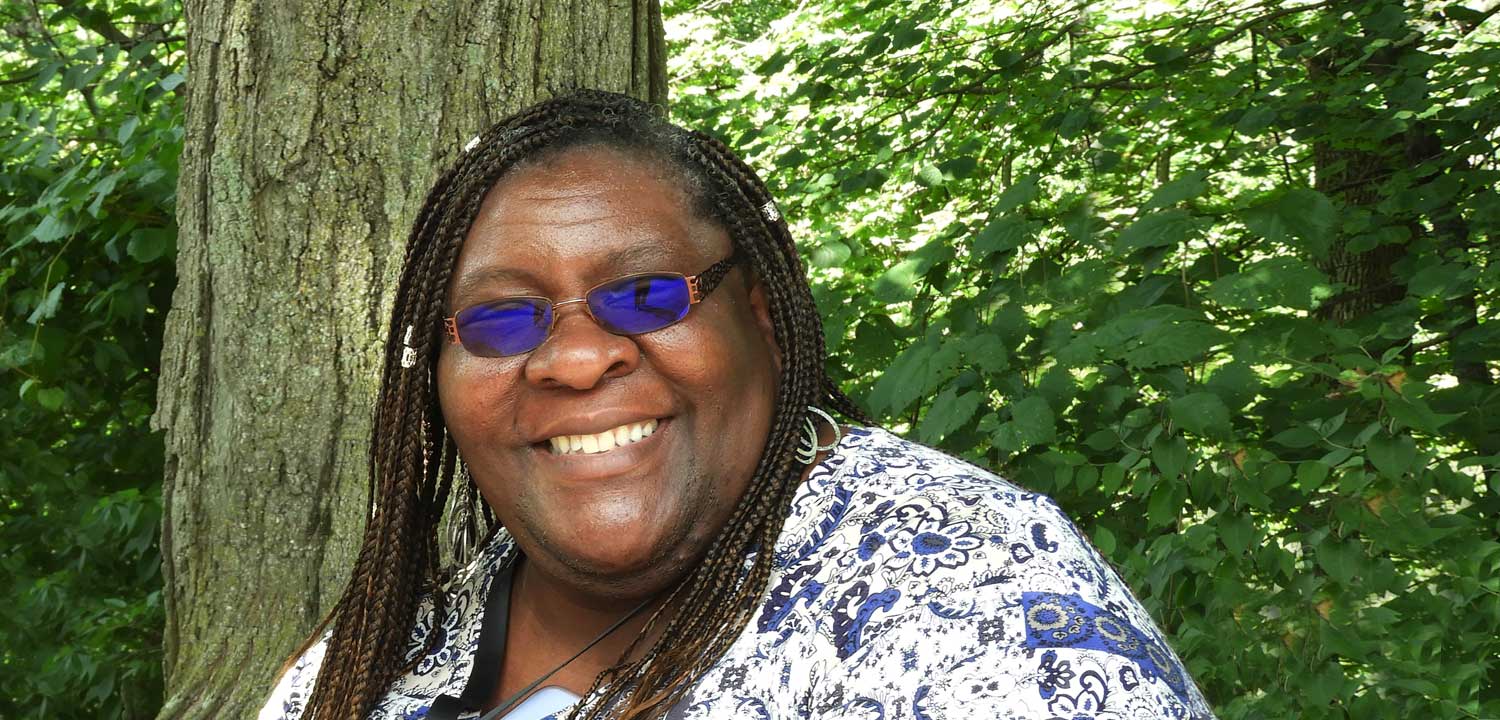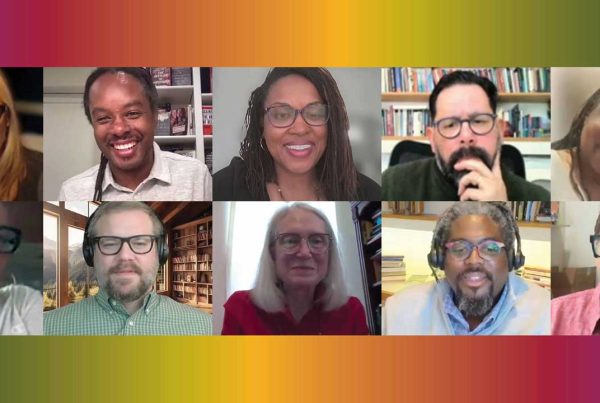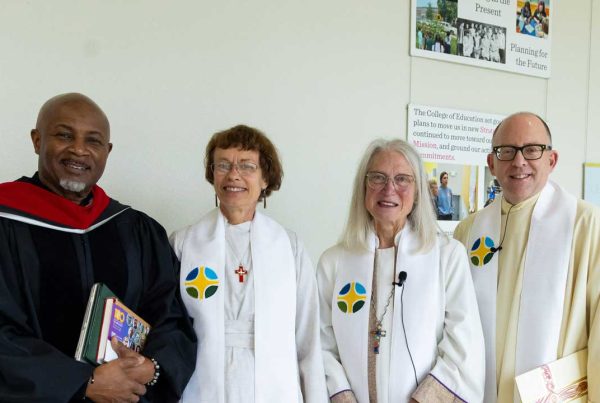Faculty Corner: Dr. Nicole Z. Robertson
In the bustling halls of academia, there are stories of inspiration, dedication, and transformation that resonate deeply with all who encounter them. Dr. Nicole Z. Robertson, Assistant Professor of Clinical Mental Health Counseling and Director of the Clinical Mental Health Counseling Program at CTS, embodies such a narrative—a journey marked by resilience, passion, and a profound sense of purpose. Her life and career are a result of her own commitment to healing and wholeness and pursing God’s call.
Dr. Robertson’s path to academia was anything but conventional. As a child, she harbored dreams of becoming a teacher, inspired by the influential role models in her life she experienced shaping young minds and hearts. However, she experienced initial discouragement from her parents who were concerned for her future financial stability. Her mother, one of the central influences in her life, grew up during the aftermath of the Great Depression and saw firsthand how important financial stability was. She was herself a trailblazer, becoming one of the first black women to serve as a supervisor in the sewing manufacturing industry where she worked.
Because of her aptitude in math and science, Dr. Robertson shifted her focus to pursue a career in information technology and software engineering. She did well in this field, but the pull towards teaching never left her. Her persistent longing to integrate her career with ministry sparked a transformative journey, culminating in a pivotal decision to resign from her successful IT career and pursue a dual master’s degree in mental health counseling and PhD in counselor education supervision.
Reflecting on her journey, Dr. Robertson shares, “I sensed the calling and passion from a young age. I listened to my parents’ concerns and made a way for myself. Then, almost 40 years later, I have seen that passion manifest. I have proven I can support myself and sustain myself through teaching, supervising others, and counseling. I sense this fulfillment of a call, this call not only to be able to serve people in the capacity of giving them hope and healing through counseling, but also training other counselors to become hope dealers and compassionate healers as well.”
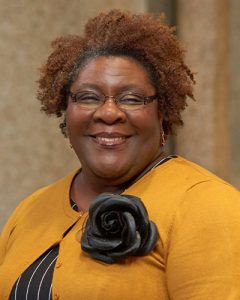 Outside of academia, Dr. Robertson finds joy in traveling, golfing, and participating in 5k walks. She gravitates towards activities that involve water, such as swimming, kayaking, and boating. As a New Orleans native, Dr. Robertson loves and appreciates everything about the city, from its music and culture to its cuisine and undying support of the city’s national sports teams. She acknowledges the influential role of God, her pastors, and millennial nieces and nephews in her life, who challenge conventional norms and inspire her with their courage and independence.
Outside of academia, Dr. Robertson finds joy in traveling, golfing, and participating in 5k walks. She gravitates towards activities that involve water, such as swimming, kayaking, and boating. As a New Orleans native, Dr. Robertson loves and appreciates everything about the city, from its music and culture to its cuisine and undying support of the city’s national sports teams. She acknowledges the influential role of God, her pastors, and millennial nieces and nephews in her life, who challenge conventional norms and inspire her with their courage and independence.
In her time at CTS, Dr. Robertson has made positive contributions to the field of mental health counseling, both as a professor and as the director of the Clinical Mental Health Counseling Program. She brings a wealth of knowledge and experience to her role, teaching courses such as Theories of Counseling, Counseling Skills and Helping Relationships, Career Counseling, Group Counseling, Social and Cultural Dimensions of Counseling, and Research Methods.
Dr. Robertson finds fulfillment in the process of shaping future counselors and therapists and guiding them through their academic and clinical journey. As the Director of the MACMHC program, she is committed to fostering a supportive learning environment that promotes healing and wholeness. She views mental health as a social justice issue and strives to prepare students to address the needs of marginalized communities. She emphasizes the importance of self-awareness and personal growth in the counseling profession, encouraging students to confront their biases and prejudices. By fostering a culture of introspection and reflection, Dr. Robertson empowers students to become compassionate healers and agents of change in their communities.
She believes the MACMHC program at CTS stands out because of its history of excellence and commitment to training compassionate therapists. The program equips students to meet the diverse needs of clients, preparing them for clinical practice by integrating psychoanalytic and cognitive-behavioral approaches among others in their academic preparation. This comprehensive approach allows for students to learn from and incorporate multiple modalities into their own practice, making it a valuable resource for prospective students seeking a comprehensive education in mental health counseling. Dr. Robertson also points out that CTS is unique in that it has a Counseling Center on site, allowing students to complete clinical hours without having to seek off-site placements.
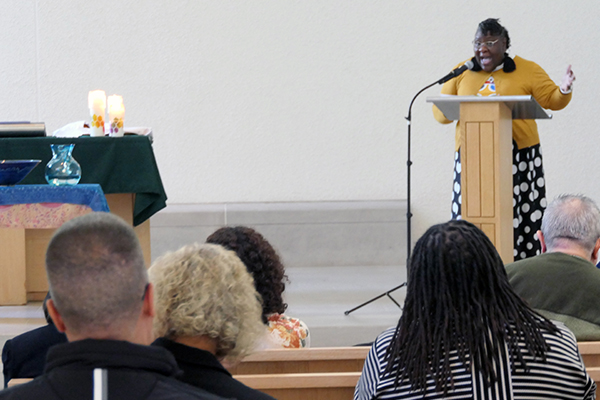 The rigorous training and comprehensive curriculum offered by the MACMHC program at CTS prepare students to excel in their roles as therapists. With a strong emphasis on clinical experience, spirituality, and self-reflection, graduates are equipped with the skills and knowledge necessary to address the complex needs of clients. Employers value the expertise and compassion demonstrated by CTS alumni, making them highly sought after in the field of mental health counseling. Dr. Robertson also highlights the impact of a spiritually integrated program. She notes, “We train our students not only to meet the state requirements for licensure, but we also incorporate spirituality training so that they are able to deal with issues around religious crisis or faith crisis that clients might bring into the room – sometimes experiences that have been positive, but also religious experiences that have caused harm.”
The rigorous training and comprehensive curriculum offered by the MACMHC program at CTS prepare students to excel in their roles as therapists. With a strong emphasis on clinical experience, spirituality, and self-reflection, graduates are equipped with the skills and knowledge necessary to address the complex needs of clients. Employers value the expertise and compassion demonstrated by CTS alumni, making them highly sought after in the field of mental health counseling. Dr. Robertson also highlights the impact of a spiritually integrated program. She notes, “We train our students not only to meet the state requirements for licensure, but we also incorporate spirituality training so that they are able to deal with issues around religious crisis or faith crisis that clients might bring into the room – sometimes experiences that have been positive, but also religious experiences that have caused harm.”
CTS’ commitment to diversity, social justice, equity, and transformation is a source of pride for Dr. Robertson. When asked which of CTS’ core values most resonate with her, Dr. Robertson shares that she identifies with CTS’ core value of promoting healing and wholeness throughout creation. “As counselors and therapists, I believe we are called to be compassionate healers and or hope dealers. Thus, innate to the work that we do, as counselors and therapists, is the promotion of healing and wholeness throughout God’s creation, namely God’s people (all of humanity who possess God’s image and have inherent worth and dignity). When we are able to promote healing and wholeness throughout God’s creation, we transform the world and make the world a better place for living and existing,” she says. The institution’s advocacy for marginalized and minority communities reflects its dedication to creating positive change in the world.
School of Counseling professor Dr. Nicole Z. Robertson’s journey serves as a testament to the power of following one’s calling, embracing resilience, and pursuing one’s passions with unwavering dedication. As a professor, mentor, and advocate for mental health and social justice, she continues to inspire and empower those around her, leaving an indelible mark on the field of mental health counseling and the broader community. Dr. Robertson is excited about CTS’ continued impact on the community and its unwavering commitment to promoting healing and wholeness. She looks forward to witnessing the transformative work of students and faculty as they engage in meaningful dialogue and action.

